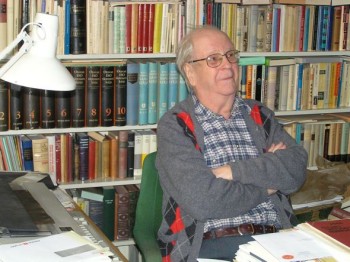In memoriam Kai Laitinen 1924–2013
14 March 2013 | In the news

Kai Laitinen. Photo: Ilkka Välimäki (the literature archive/Finnish Literature Society, 2006)
The journalist, critic, author and professor Kai Laitinen died on 11 March in Helsinki, aged 88.
He began his literary career as a critic in the daily paper Helsingin Sanomat in 1950. As the Editor-in-Chief of the new literary journal Parnasso he was able to promote the new trends in modernist fiction and poetry which began to flourish in post-war Finland.
Laitinen’s academic career at Helsinki University involved serving as Associate Professor and Professor of Finnish literature (1975–1989). From the 1950s onwards he was actively involved in the work of dozens of literary societies, publications and organisations, both in Finland and abroad.
Among his publications are two collections of essays, a book of memoirs and two popular books on history of literature: Suomen kirjallisuus 1917–1967 (‘Finnish literature 1917–1967’) and a more concise work, Suomen kirjallisuuden historia (1981‚ Literature of Finland in Brief), which has been published in eleven languages.
Kai Laitinen was appointed Editor-in-Chief of Books from Finland in 1976 when the little magazine, then in its tenth year, began to take the form of a proper literary journal and to be published by Helsinki University Library. He held the job until 1989.
In issue 4/1977 of Books from Finland, on the theme of the 60th anniversary of Finland’s independence and the changing role of literature, Kai wrote in the editorial: ‘Literature is, and must be, much more than a chronicle of national and social history, or the mere accumulation of changing styles and genres. So often it is an author’s critical insight or his struggle against prevailing literary norms that gives birth to the works of the greatrest artistic importance. One of the main tasks of literature, both on a national and a human level, can be summed up succinctly in two lines from T.S. Eliot’s Little Gidding – “To purify the dialect of the tribe / And urge the mind to aftersight and foresight.” This comes close to describing what Finnish literature has achieved over the past sixty years.’
T.S. Eliot was the poet who perhaps had a permanent place in Kai’s personal literary cosmos – he introduced Eliot’s poetry to Finnish readership in the late 1940s. This passage, from Little Gidding, might well serve as his epitaph.
….We shall not cease from exploration
And the end of all our exploring
Will be to arrive where we started
And know the place for the first time.
